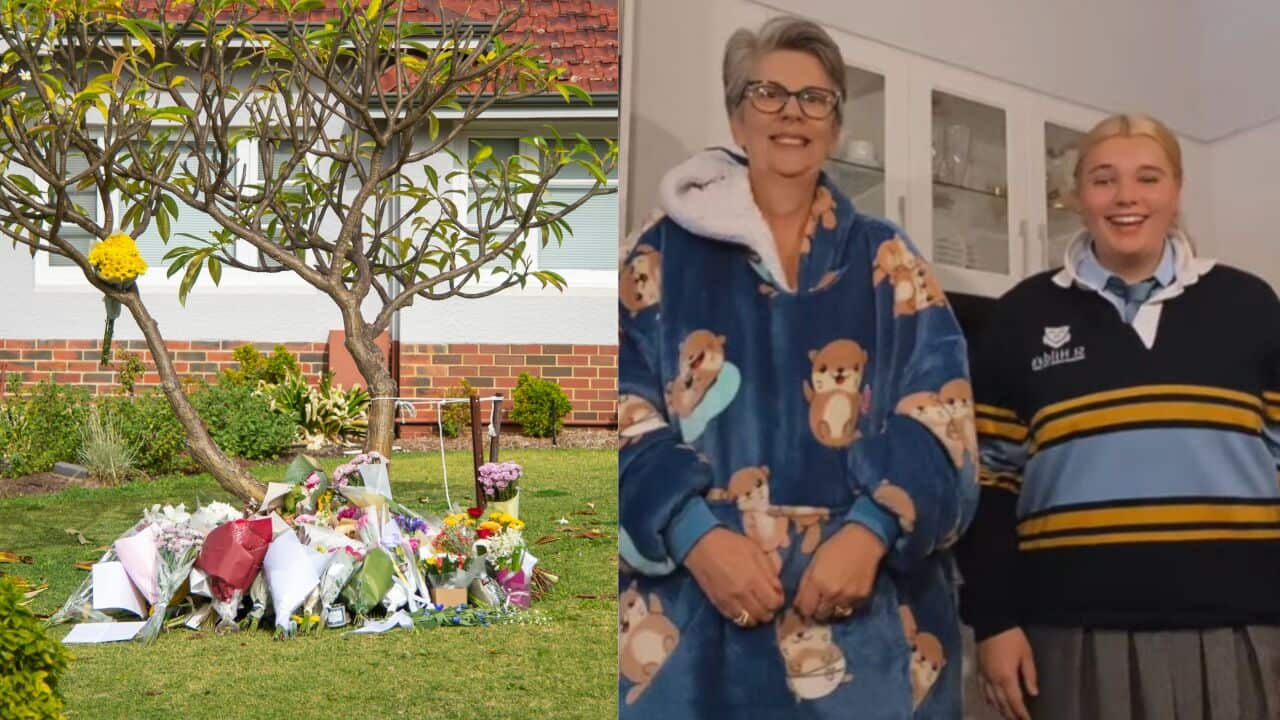Key Points
- Two women were shot dead by a man who came to their home where his former wife had sought refuge, but was not present.
- Politicians and advocates say it was domestic and family violence related but police have not classified it as such.
- The way deaths are reported can impact decision making, planning and funding around domestic and family violence responses.
This story contains reference to distressing content.
Western Australian Premier Roger Cook has called a "senseless" and "sickening" crime that was "motivated by family and domestic violence".
These comments appeared at odds with the police’s earlier categorisation of the crime, perpetrated by a man who was believed to be searching for his former wife at the time and went on to take his own life.
WA Police said on Saturday afternoon that police were not treating the incident as a family violence matter due to the man and the mother being unrelated. Police said they were known to each other and had met previously.
"The 63-year-old man and the 59-year-old weren't related in these circumstances," Detective Inspector David Gorton told a press conference.
"We are not treating this as a family violence matter. We will still be preparing a report for the Coroner in relation to all of the circumstances surrounding this, and whether or not the relationships form part of this incident."
‘A crime motivated by family and domestic violence’
The offender, named as Mark Bombara, fatally shot his former wife's best friend Jennifer Petelczyc, 59, and her daughter Gretl Petelczyc,18, in their Floreat home on Friday.
He was reportedly searching for his ex-wife when he went to the home and fatally shot them, then himself, as police arrived at the property.
His daughter, Ariel, said in that she and her mother fled their family home on 28 March "in fear of our lives and to remove ourselves from an abusive situation".
She told police there was a "real and imminent threat" to both her and her mother's lives but felt she was "repeatedly ignored" and "repeatedly failed" by authorities. She said she spoke with police on three separate occasions to convey serious concerns about her father.
"I did everything I could to protect my mother, and when my father couldn’t find us he murdered her best friend and her best friend’s daughter," she said.
"What my father did was an act of domestic violence."
WA police commissioner Col Blanch told reporters on Tuesday that the WA police internal investigations unit would investigate Ariel's claims.
Cook said on Monday: "Jennifer and Gretl were doing what was right — they were helping a friend in need. What happened to them was horrific. It was senseless. It was sickening."
He said this was "a crime motivated by family and domestic violence (DFV)".
"As a society, we need to do better to put a stop to family violence."

Western Australian Premier Roger Cook said the incident was motivated by domestic and family violence. Source: AAP
Police Minister Paul Papalia confirmed on Monday that the offender was a licensed firearm owner with no prior convictions. He owned 11 guns under a recreational shooter's permit and two handguns under a collector's licence.
He said the offender's ex-wife had approached police for help moving out of their shared house in late March following a "series of family and domestic violence-related matters".
"But none of those had been reported to police, and he [Bombara] was not known to the police in any other way, other than her approaching them at that time."
Speaking earlier on Monday, the state's Prevention of Family and Domestic Violence Minister Sabine Winton said that “everyone knows, in the community, what this was”.
"This was an act of violence against women for no other reason than they were supporting a victim trying to flee a relationship,” she said.
"Any act of violence against any women is totally unacceptable, it's abhorrent and it was a gutless act."
What do DFV advocates and organisations think?
Alison Evans is the chief executive of Perth-based Centre for Women’s Safety and Wellbeing, which supports women and children affected by gender-based violence.
She said the details that had been reported about the incident indicated that it was related to domestic and family violence.
"Based on the information we have available, Mark James Bombara was looking for his ex-wife carrying a firearm. That in itself is an act of domestic and family violence," she said.
"Such an act of violence is rarely, if ever, a one-off incident."

Flowers outside the house where the two women were shot dead in Perth. Source: AAP / Aaron Bunch
She said the way such incidents were spoken about and classified was important in decision-making, prevention and data collection.
"It is highly important that this is classified as a domestic violence death so that it can be included when we are reviewing deaths to inform our decision-making and planning around improving our responses to, and prevention of, domestic and family violence deaths," she said.
"It is important to capture all domestic violence deaths so we gain detailed information regarding histories of domestic and family violence leading up to the homicide, and information beyond the fatal episode of violence."
Evans said the data is critical in providing a more "informed, holistic" understanding of the circumstances surrounding domestic and family violence-related deaths.
'Problematic' framing leading to 'confusing' discussions about violence
Sharna Bremner, who advocates for a safer society for women as the founder of End Rape on Campus Australia (EROC), viewed the framing of Friday's shooting as "problematic in so many ways".
"The way we frame discussions and action around gender-based violence in Australia is often confusing, especially for younger people who don't see their experiences of violence reflected in the terms "domestic" or "family" violence," she said on X, formerly known as Twitter.
"The belief that two people must be related in some way for the violence perpetrated by one person against the other to be considered "domestic" or "family" is incorrect, but it's actually incredibly common, which is a massive problem."
According to Bremner, many of the young people supported by EROC Australia who are experiencing violence in an intimate partner relationship do not recognise that as being "domestic violence", which can impact help-seeking.
She also referred to the Australian Domestic and Family Violence Death Review Network, which was set up in 2011 to collect and analyse data on DVF-related deaths across Australia in an effort to improve systemic responses.
"The national DFV Death Review Network definition of domestic homicide includes 'collateral homicides' in the context of DFV, so this framing by WA Police is just plain incorrect," she said.
The Network published a national report into all intimate partner homicides that occurred in a domestic violence context in 2018. It worked with Australia's National Research Organisation for Women's Safety (ANROWS) on an updated report, published in 2022.
The report acknowledges that identification and classification of domestic and family violence deaths is "complex and needs to be conducted cautiously". Among the considerations was whether a homicide occurred in a domestic or family violence context — including where no direct domestic relationship exists between the deceased and offender.
"This might include a bystander who is killed intervening in a domestic dispute or a new partner killed by their current partner's former abusive spouse," the report says.
The Network was made up a representatives from review teams across the country, including the Domestic and Family Violence Review Unit in Queensland.
In a 2019-20 annual report on DFV published by the Queensland review body, collateral homicides were defined as "the death of a person who may have been killed intervening in an episode of domestic and family violence or a new partner who was killed by their current partner’s abusive former spouse".
Bremner argued the comments made by WA Police "ignore that abuse often occurs by proxy — that is, an offender inflicting upon a victim via third parties".
"Often abuse by proxy is non-physical abuse, but it's not uncommon for it to be physical, as we've devastatingly seen recently."
State leaders in talks with police about definition
A spokesperson for WA Police told SBS News on Monday afternoon its officers "have always accepted that the motivation for these crimes were family and domestic violence (FDV) related, however the crimes committed were murder, and ultimately the contributing factors will be a matter for the Coroner to consider".
When questioned whether collateral homicide is something it would use to categorise a death, the spokesperson provided a definition of FDV found within the Restraining Orders Act, stating family violence "was in regard to violence, a threat of violence, or any behaviour that coerces or controls a family member".
WA Police Minister Paul Papalia told a press conference on Monday that the definition around domestic and family violence was being considered.
"The premier and I, we are talking to police and others about how we might revisit the definition," he said.
"The current definition for the relevant parts of different acts essentially, only refers to intimate partner violence in terms of killing an intimate partner and that is FDV-related.
"In this case, clearly it's FDV-related. It's what motivated the crime. It's not disputed. Police acknowledge that that is the case."
At the same time, Papalia said: "It makes no difference materially to the investigation or the prosecution of the investigation".
Cook said the police investigation into what occurred is ongoing, and that a a Coronial inquest will follow.
If you or someone you know is impacted by family and domestic violence, call 1800RESPECT on 1800 737 732, text 0458 737 732, or visit . In an emergency, call 000.
Readers seeking crisis support can contact Lifeline on 13 11 14, the Suicide Call Back Service on 1300 659 467 and Kids Helpline on 1800 55 1800 (for young people aged up to 25). More information and support with mental health is available at and on 1300 22 4636.
supports people from culturally and linguistically diverse backgrounds.













